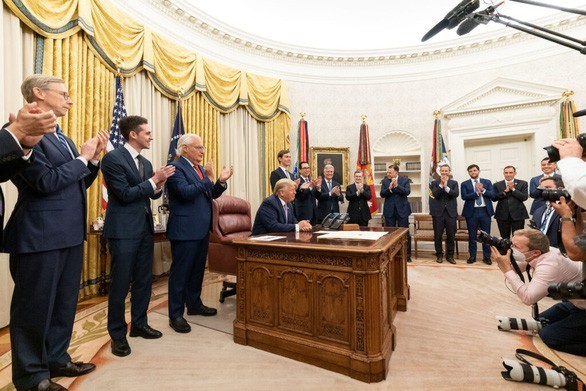(VOVWORLD) - The United Arab Emirates and Israel have announced a US-brokered accord that makes the UAE the third Arab country—and the first in the Gulf—to normalize relations with Israel, following Egypt in 1979 and Jordan in 1994.

US President Donald Trump announces the normalization of Israel - UAE relations at the White House on August 13, 2020. (photo: Whitehouse.gov)
|
Under the deal, Israel agrees to postpone annexation of occupied Palestinian land, which the UAE says relieves the immediate threat to a two-state solution for the Palestine-Israel conflict. Many countries have hailed the agreement as a step toward regional peace while many others have expressed skepticism, some calling it a dangerous development.
Analysts say that, regardless of these differing points of view, the accord is a historic milestone for the region.
Hopeful expectations
After the US announced the agreement last week, many countries, including Russia, Germany, Japan, Egypt, Bahrain, and Oman, applauded it. German Foreign Minister Heiko Mass called normalizing Israel-UAE relations an important contribution to regional peace. Egyptian President Abdel Fattah El-Sisi said the agreement will bring peace to the Middle East. Vladimir Dzhabarov, First Vice-Chair of the Foreign Affairs Committee in Russia's Federation Council, said it will certainly help to normalize a situation which had become very strained.
UN Secretary General Antonio Guterres said that resolving the Israeli-Palestinian conflict is the “key to sustainable peace in the Middle East”.
Analysts say that easing diplomatic tensions between Israel and the UAE could pave the way for similar agreements between Israel and other Arab countries.
Agreement could have negative results
From Iran’s point of view, the Israel-UAE accord is a victory for the US-led effort to isolate Iran.
Iranian armed forces chief of staff Major General Mohammad Bagheri said Sunday that the UAE will be held responsible “if something happens in the Persian Gulf to harm Iran’s national security.”
The Islamic Revolutionary Guard Corps (IRGC) said the agreement was a result of US interference and “will endanger the future of those residing in glass palaces in the UAE.”
Nabil Abu Rudeineh, a senior advisor to the Palestinian President, said Palestine denounces the accord as “a betrayal of Jerusalem, Al-Aqsa, and the Palestinian cause.”
The Turkish Foreign Ministry expressed grave concern that the UAE, through this unilateral act, will derail the Arab Peace Initiative endorsed by the Arab League and supported by the Organization of Islamic Cooperation.